Aug 29~30, 2025 – Oceania Lecture Tour (1) Sydney
Hello. Sunim successfully completed the North American West Coast lecture tour yesterday. He is beginning his Oceania lecture tour today. Today marks the first stop with a lecture in Sydney.

Sunim departed from Los Angeles International Airport at 11 PM on the 29th and rested throughout the night in his airplane seat. After a lengthy 15-hour flight, with a day lost due to the time difference, he arrived at Sydney International Airport at 7:40 AM local time on the 30th.

After collecting his luggage and exiting the airport, Jungto members residing in Sydney warmly welcomed him with a bouquet made of wildflowers.
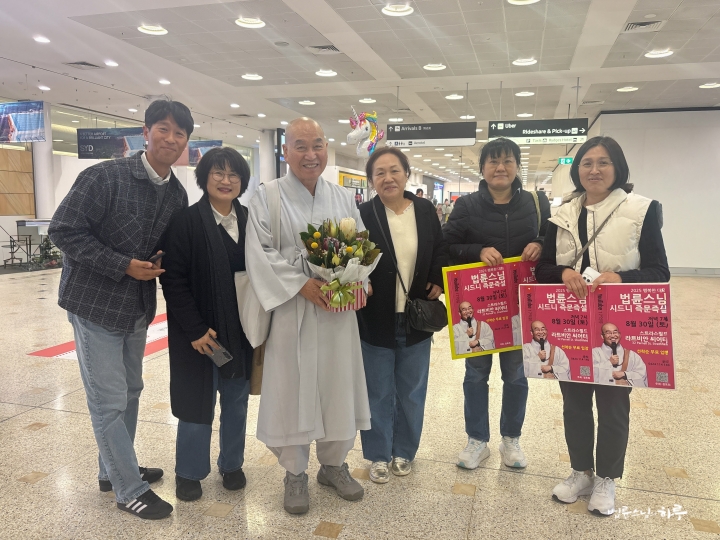
He immediately headed to his accommodation. Arriving at 8:10 AM, he had a simple breakfast and then participated in an online meeting of the Standing Committee for the 1000-Day Practice Preparation from 10 AM.
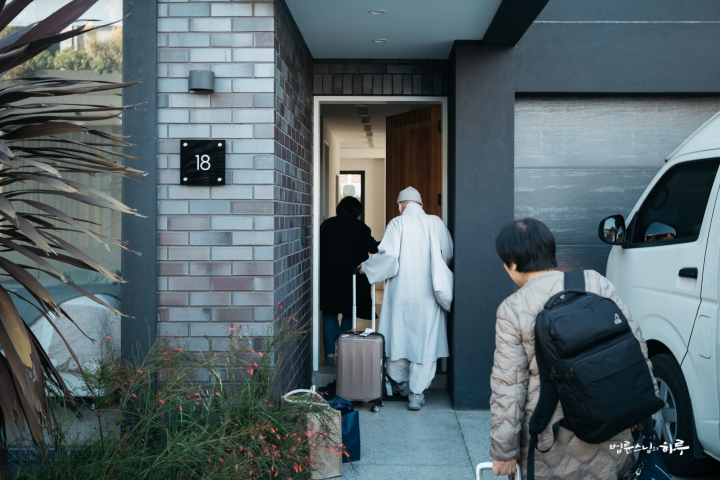
After the meeting, he had lunch and rested.

At 6:30 PM, Sunim departed from his accommodation to the lecture venue. However, an unexpected situation arose. Train services were suspended today and replaced with buses, causing extreme traffic congestion in the city. Although Strathfield Station, right in front of the lecture venue, was only a 3-minute drive away, vehicle entry was blocked from the station entrance, forcing them to get out midway and walk to the venue.
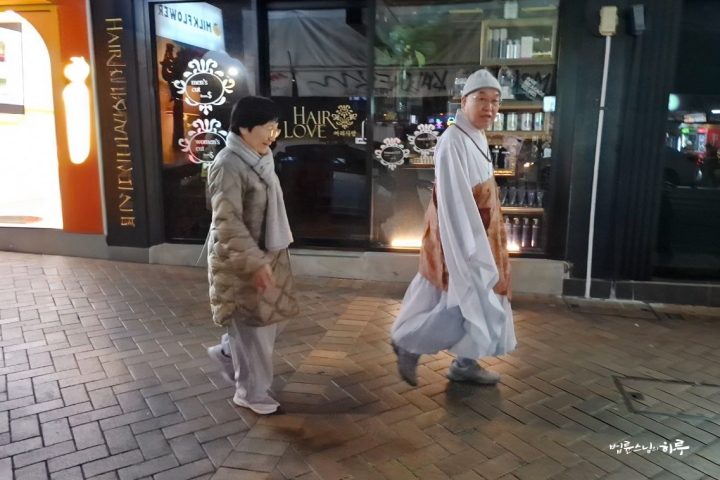
Today’s lecture was held at the Latvian Theatre in Strathfield, Sydney. This intimate yet elegant small theater serves as a space for various cultural events and lectures in the local community.
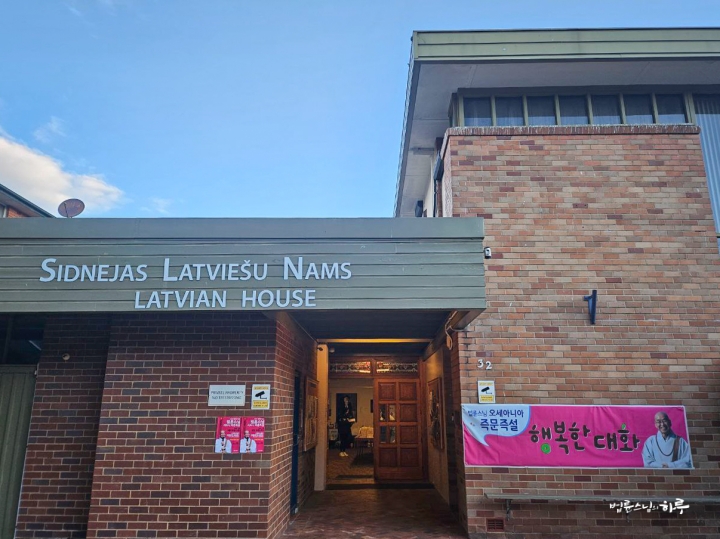
When Sunim arrived at the venue, volunteers were warmly welcoming lecture attendees throughout the venue. The volunteers had diligently posted lecture posters all over Sydney to encourage as many people as possible to attend. The venue was bustling with many Korean expatriates.
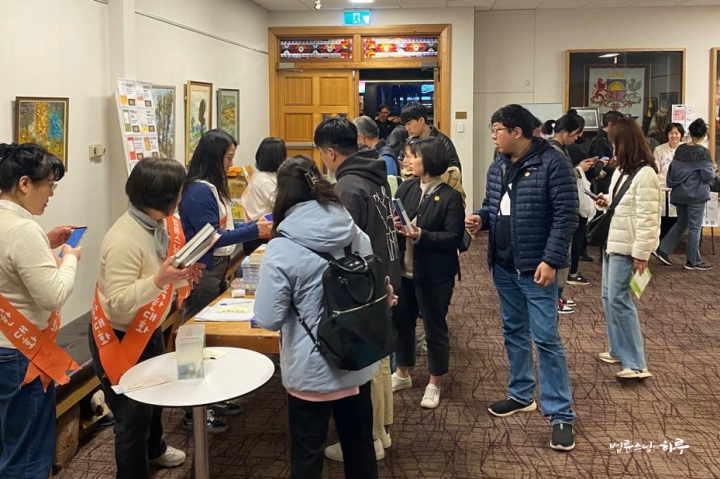
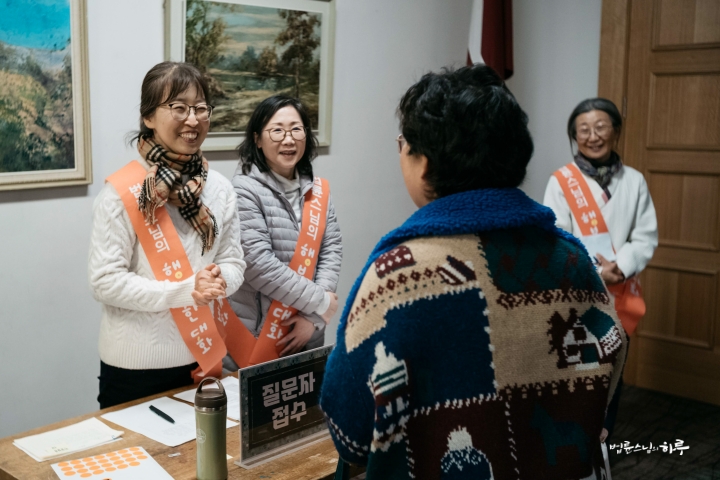
More young people were visible than before, and with all prepared seats filled, latecomers had to stand throughout the lecture.
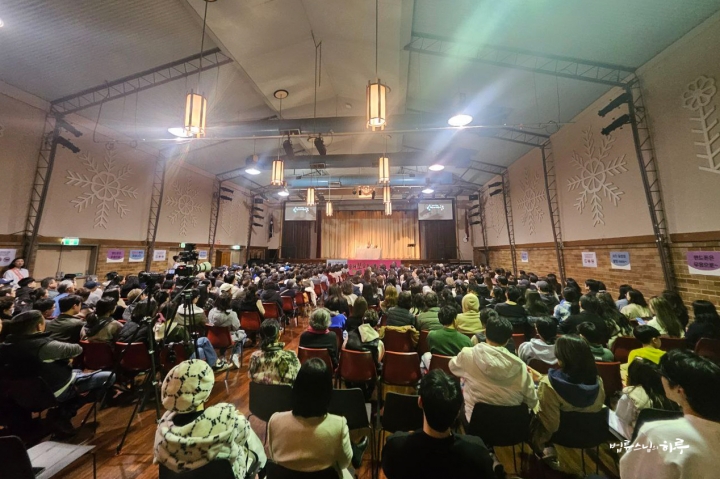
With about 430 people filling the theater, Sunim walked onto the stage at 7 PM to great applause. First, Sunim offered his greetings with a bright smile.
“How have you been? I heard Korea is experiencing a severe heat wave this year, but coming here, it’s completely winter! (Laughter)

Dharma Q&A isn’t about discussing any specific topic. It’s a casual conversation space where we can talk about doubts, problems to solve, or stress that arise in life, just like chatting with a friend over a cup of tea saying ‘I have this concern.’ After our conversation, if you realize your worries aren’t a big deal or find a way to solve your problem, you can simply say ‘I understand well’ and put down the microphone. So, shall we begin our conversation?”
Those who had pre-registered their questions raised their hands and began conversing with Sunim. Over two hours, eight people were able to ask Sunim questions. Various life concerns and questions followed. One person wanted to be a good person but found it difficult to express opinions due to fear of conflict, seeking Sunim’s advice on how to respect others while protecting oneself.
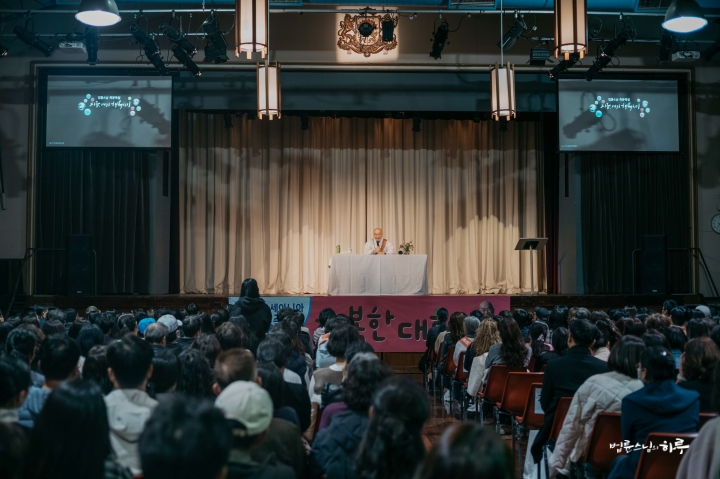
Why Do I Get Treated Like a Pushover When I’m Just Trying to Be a Good Person?
“What you want is more difficult than becoming president. That’s because you’re trying to have two mutually contradictory things at the same time. Becoming president or a saint can be achieved by having one thing and giving up the rest, but since you’re trying to have both, no matter how small the goal, it’s impossible to achieve in reality.”
“Is it contradictory to want both recognition and respect?”
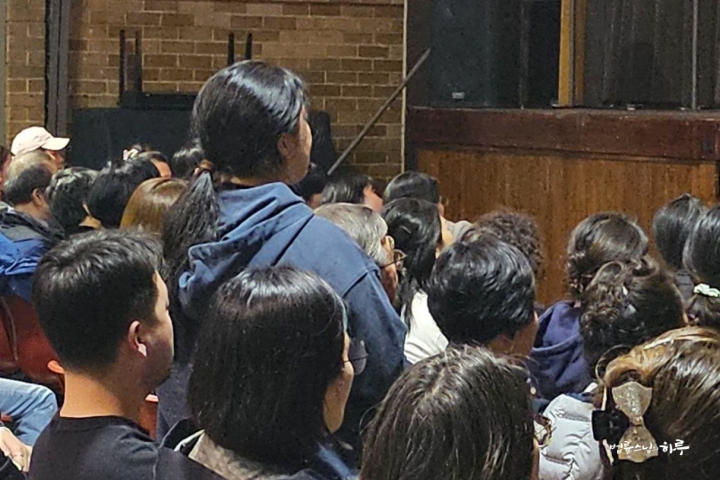
“To hear good things from others, you have to pay the price. Let’s look at when we say ‘That person is really nice’ about someone around us. When we go out to eat, we think the person who pays for the meal or coffee is a good person. When we go camping, we call the person who prepares the food a good person. Like this, to be called a good person, you have to pay a price – whether it’s financial expenditure, complimenting others, or paying in some way. But right now, you’re asking something like ‘I want to hear good things but it costs too much money. Isn’t there a way to hear good things without spending money?’ There’s no such way.”
“Isn’t there a middle ground where I can both hear good things and be respected?”
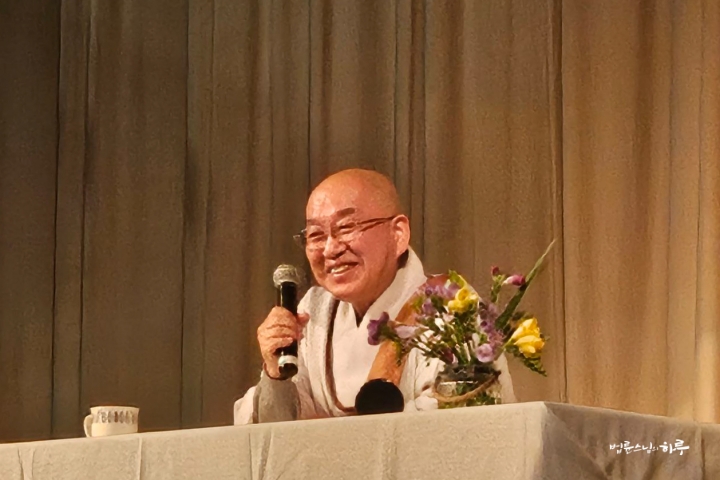
“You can hear good things sometimes and get criticized sometimes. You think the middle ground is not spending money and not getting criticized, but that’s not the middle ground. The middle ground is sometimes getting criticized and sometimes not paying. If you want to be praised by others, you have to live your whole life watching what others think. Don’t think ‘Why should I live watching what others think?’ Just live that way. Because you chose that path because you want to be praised. On the other hand, if you want to say what you want and spend less money, you shouldn’t expect praise from others and must be prepared to face criticism sometimes.
When a friend needs money and you lend it, you’ll be praised as ‘someone who helps friends in need,’ right? But money lent to friends is unlikely to be returned. If you don’t lend it, you’ll easily be criticized as ‘someone who won’t even lend money to a friend for just a few days.’ If you lend it because you don’t want to be criticized, word gets out and other friends come to borrow money too. That’s because people psychologically tend to contact those more likely to lend.
When I was a student, I went to temples and Buddhist organizations to receive donations for Buddhist events. There was a list of donors, and just by looking at that list, I could tell where donations were given generously and how much. So I would always visit places that donated well. On the other hand, places that refused two or three times were removed from the list, thinking ‘There’s no point going there, they won’t give.’ So once you help, the demands grow. That’s how the world works.
So if you don’t meet their expectations, you get criticized even after helping, making you think ‘Why are they treating me this way?’ You can understand this psychological mechanism better if you go to India. When you travel to India, children follow you around begging, saying ‘baksheesh, baksheesh.’ If one person gives money and another doesn’t, the children keep following the person who gave money. Then the person who gave money thinks ‘Why don’t they ask that person too? Why are they only following me?’ But that’s not how people’s minds work.
If you want to live with less concern about what people think, you need to accept not just praise but criticism too. Simply put, you need to think ‘It’s okay to get criticized sometimes.’ When someone asks to borrow money, you can either lend it and hear good things, or not lend it and hear bad things. But you seem to be thinking ‘Isn’t there a moderate way where I don’t lose money and don’t get criticized?’ It seems like a simple problem to solve, but actually, there’s no such way.
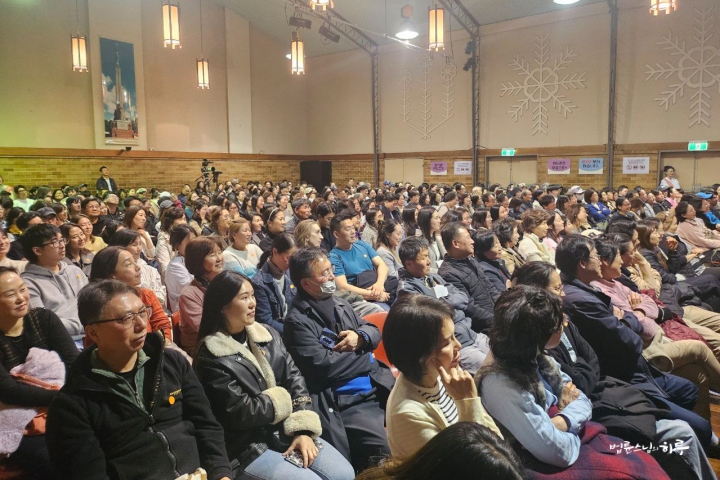
Of course, it’s possible to respond differently depending on the situation. You can lend money to some people and avoid criticism, while not lending to others and accepting the criticism. However, there’s no perfect solution to the question ‘How much should I lend to lose less money and avoid criticism?’ because everyone’s demands are different.
So you need to first choose how you want to live. Until now, you’ve lived kindly to receive praise, so will you continue living that way, or will you live without worrying about what others think, even if it means accepting some criticism? From what I can see, it would be difficult for you to suddenly start living while accepting people’s criticism. Even if you speak up at work when you have something to say, you shouldn’t take it badly when people respond negatively. You should think, ‘It’s natural for people to say unpleasant things when they feel bad after hearing direct words.’
When I helped starving North Korean people, many criticized me. Some even said, ‘If you want to help North Koreans so much, just go to North Korea.’ Recently, when I express my views on social issues in Korea, such as the presidential martial law issue, many people criticize me saying ‘A monk is getting involved in politics.’ However, criticism is unavoidable because everyone sees the world from their own perspective. No matter how considerately I speak the truth, people will inevitably hear it differently. That’s why we must live accepting a certain amount of criticism in this world.
Looking at the Bible, did Jesus only receive respect in society at that time? No. He wasn’t just criticized by the establishment of that society; he was branded as a heinous criminal to be crucified. What about the Buddha? Though not as much as Jesus, he received tremendous social criticism. Are you a more remarkable person than the Buddha or Jesus? That’s an enormous greed. Living in this world, you’re bound to receive some criticism. It’s not necessarily because you’ve done something bad, but because people have different thoughts and perspectives. Even good deeds can appear bad to someone.
“Thank you. I’ll continue living kindly while occasionally speaking up and being prepared to face criticism.”
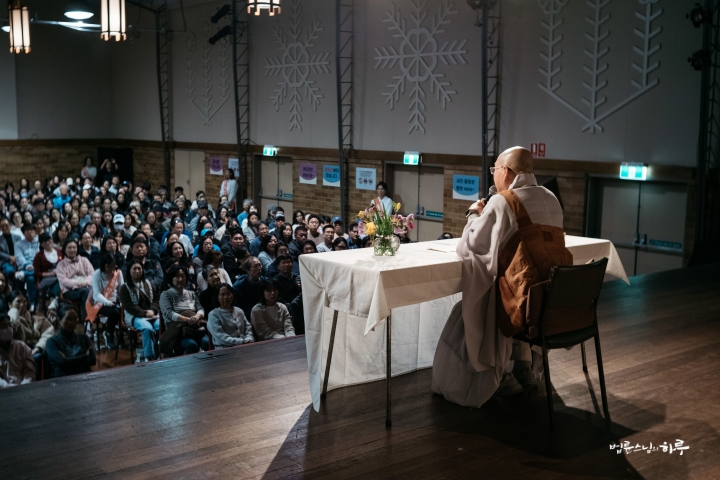
“Living kindly while speaking up? That doesn’t match.”
“You said I could act differently depending on the situation.”
“You should have the perspective of ‘I’ll live casually while speaking my mind.’ That’s how you can be free.”
“Yes. I’ll live casually.”
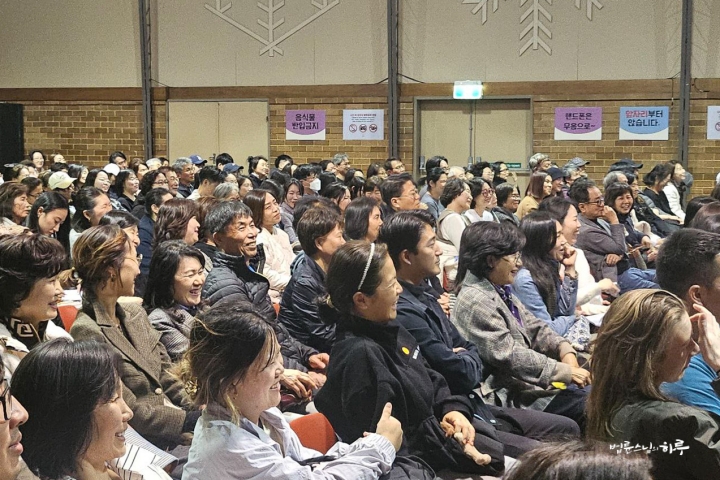
Questions continued one after another.
-My colleague lies but receives love from our boss, while I’m honest yet receive hatred. Why does this happen?
-Early in my career, my relationship with my boss was difficult. It feels unfair that my boss takes all the credit for my work.
-Is human destiny predetermined or not?
-I’m in a difficult situation between my cousin and aunt’s conflict. My cousin is dating someone with intellectual disabilities, and my aunt opposes it.
-I cut ties with my father who committed domestic violence and had affairs that hurt us. Should I forgive him now to avoid regret after he passes away?
-I can’t sincerely congratulate others on their success and often copy other people’s lives. How should I live?
-My wife’s personality has become stronger compared to before. Meanwhile, I’ve become weaker and more emotional, which is difficult.

As the conversation deepened, one questioner asked how to notice negative thoughts more quickly, saying they always realize too late and it’s a constant worry.
How Can I Notice Negative Thoughts More Quickly?
“Awareness happens instantly; realizing something late is not awareness. So the question of how to practice awareness quickly doesn’t make sense. Awareness happens in an instant. If you feel bad right now, knowing ‘I feel bad,’ if you fall, knowing ‘I fell,’ if tears come, knowing ‘I’m sad’ – that immediate knowing is awareness. Therefore, the phrase ‘practicing awareness quickly’ doesn’t apply.
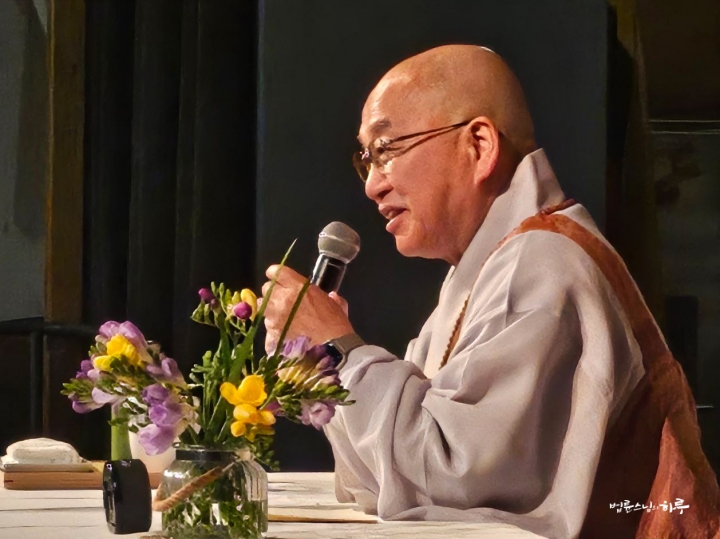
When negative thoughts spiral one after another, it means you’re giving meaning to those negative thoughts. If you don’t give meaning, it ends there, but if you give meaning, it leads to another thought.”
“I don’t give my thoughts much meaning; they just flow, and it’s only later that I realize they have drifted into negativity.'”
“That’s not true. Realizing it later means you’ve already given meaning. When any thought arises, you shouldn’t give it meaning.”
“That doesn’t seem easy. When I’m tired and exhausted, even the moment of deciding whether to give meaning or not passes by.”
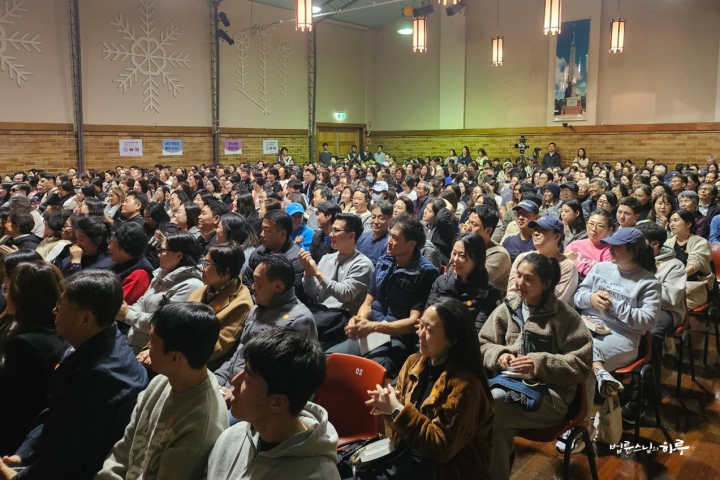
“That’s why we meditate. Meditation is stopping thoughts, not continuing them. Even good thoughts about the Buddha are not meditation. That’s contemplation, reflection, delusion. Meditation is not giving meaning to any thought that arises. If you think of the Buddha, you should note ‘I thought of the Buddha’ and return to your breath. If you think of Venerable Pomnyun, you should note ‘I thought of Venerable Pomnyun’ and return to your breath. If thinking of Venerable Pomnyun leads to thinking of his teachings, and thinking of his teachings leads to thinking about their content, that means you’re giving meaning. If you give meaning, it’s not meditation. That’s creating delusions.
You shouldn’t give meaning to any thought that arises. If you’ve had various thoughts, just be aware ‘I was contemplating.’ Whether you think ‘Should I do this or that?’ or ‘This person is like this, that person is like that’ – if you were contemplating, just be aware of the fact that you were contemplating. It doesn’t matter whether you noticed early or late. If the contemplation was useless, just be aware ‘That was useless contemplation.’ Whether you notice quickly or slowly is meaningless. What’s important is being aware ‘I had negative contemplation.’
You think you need to notice quickly because you’ve decided that negative contemplation is unnecessary. Being aware is knowing ‘I had negative contemplation’ after having negative contemplation. Judging that negative contemplation was wrong is regret, not awareness. Awareness is simply knowing ‘I’m having negative thoughts right now’ as they are.”
“I think I didn’t accurately understand the term ‘awareness.’ The point of my question is that I’d like to notice negative thoughts a bit earlier so I wouldn’t have them.”
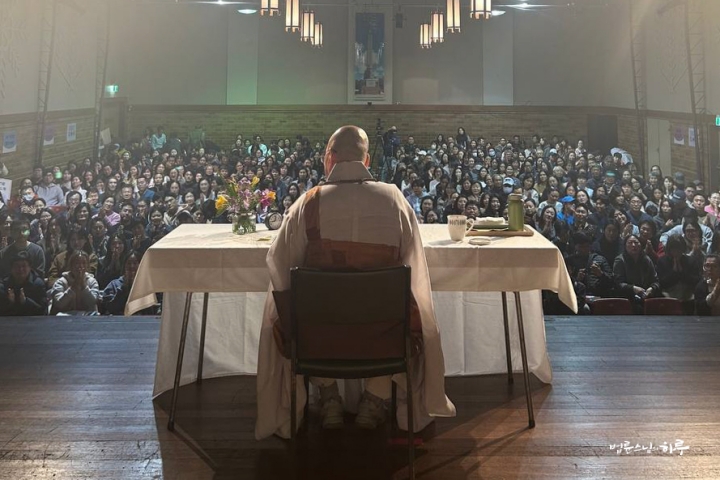
“That’s exactly desire. It’s just another desire, like the desire to make a lot of money. When you’re having negative contemplation and realize ‘I’m having negative contemplation,’ that’s called awareness. Thinking ‘If I had noticed earlier, I wouldn’t have fallen’ after falling is regret, not awareness. When you fall, knowing ‘I fell’ is awareness. Figuring out how not to fall is not awareness.
If you want to make money, just make it. But if you want to make a lot without making the effort to earn it, that’s greed. Similarly, if you don’t want to have negative contemplation, just don’t have it. Saying ‘I don’t want to have negative thoughts but I keep having them’ ultimately means you think you shouldn’t have negative thoughts but deep down you want to. It’s not that you don’t want to; it’s that you think you shouldn’t.
Awareness is knowing you’re lying down when lying down, knowing you’re walking when walking, knowing you fell when you fall. There’s no ethical or moral judgment in this. Saying ‘I should do this’ or ‘I should do that’ is not being aware of your mental state; it’s merely creating desires like ‘I wish it were like this’ or ‘I wish it were like that.'”
“Thank you. I’ll study more.”

As Sunim concluded the dialogue, he offered a new perspective on looking at life’s problems.
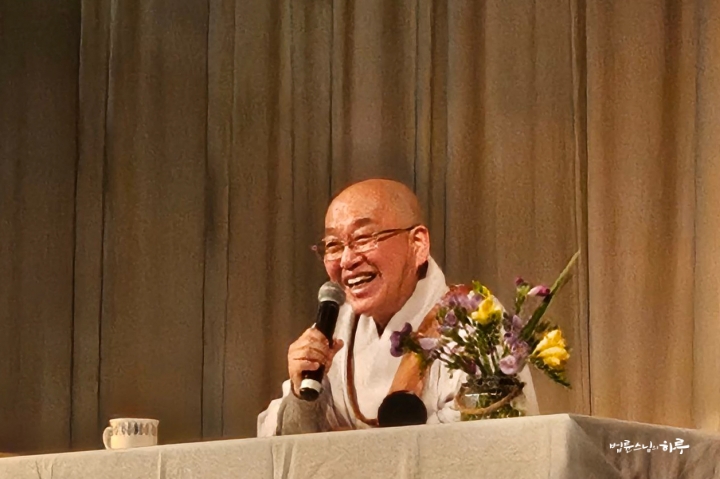
“When you look at life from a broad perspective, nothing is a problem. Events just happen. Even the issues of birth and death aren’t significant from a global perspective. It’s just like waves rising and disappearing in the ocean. But when you look closely at life, everything seems like a problem. Nothing appears to not be a problem. That’s why you need to step back and look from a distance. The best solution is knowing ‘Various events just happen, actually nothing is happening.’ In Buddhist terms, this is called ’emptiness (空).’
You think solving problems is the best path, but an even better path is knowing ‘There’s no problem at all. It’s no big deal.’ Of course, there are ways to solve problems wisely. However, knowing ‘I can solve it this way’ is considered minor wisdom. The best approach is to just let it pass, thinking ‘It’s no big deal.’ If it seems like ‘a big deal,’ you can solve it by understanding the cause well. Since every problem in the world has causes and effects, most can be easily solved by understanding the causes well. I hope you live wisely with this perspective.”
After the lecture, a book signing event was held in the theater lobby. Many attendees lined up in a long queue, waiting their turn to see Sunim up close and get his autograph.
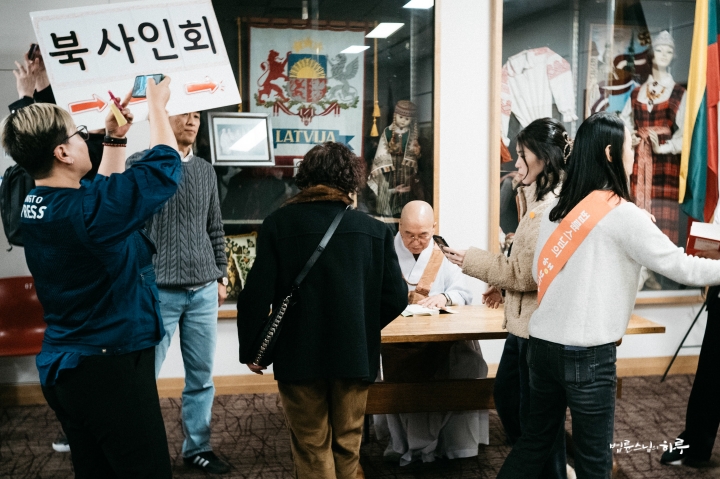
“Sunim, I really enjoyed today’s lecture. I’ve become much happier after listening to the Dharma Q&A.”
Most people receiving autographs expressed their gratitude to Sunim.
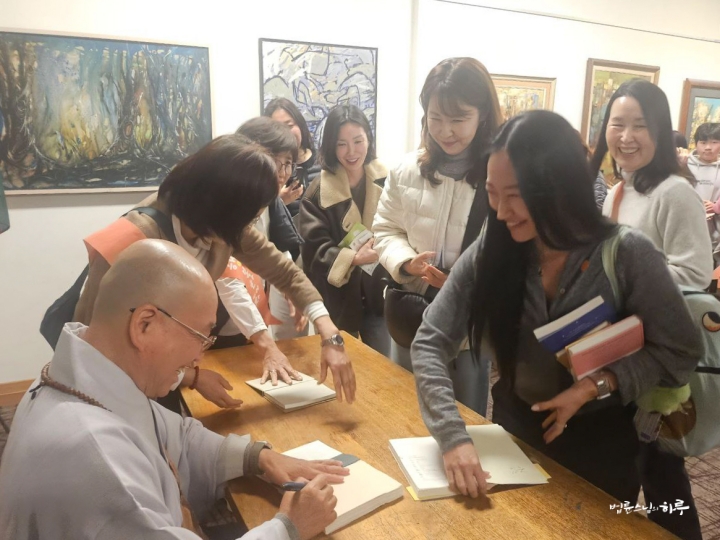
After the book signing, Sunim took a commemorative photo on stage with the volunteers who had prepared the lecture.
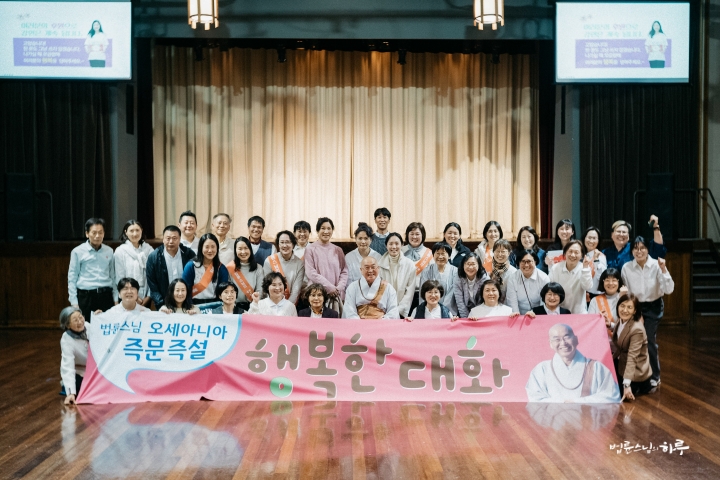
Sunim presented a book to Kim Soo-hee, who coordinated the lecture.
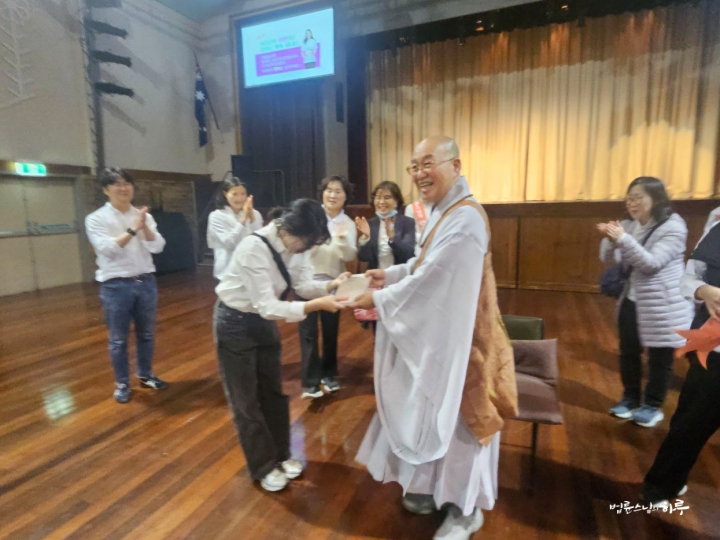
After expressing gratitude to the volunteers, Sunim headed to his accommodation. The volunteers had a mindful sharing session with Dharma Teacher Myodeok before cleaning up the venue.
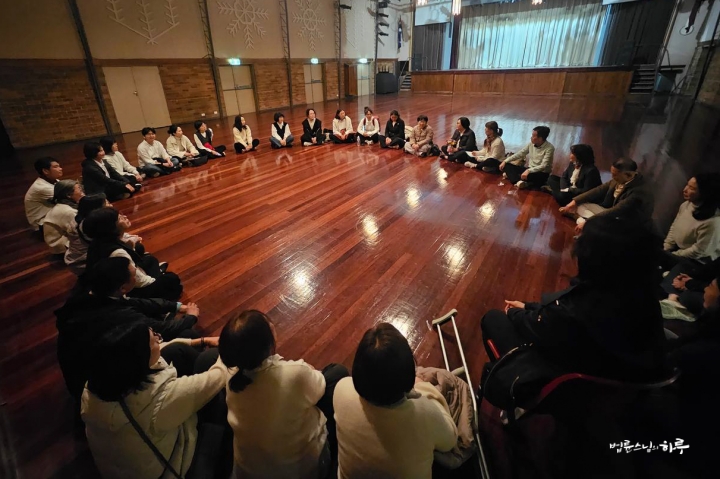
“Being introverted, it was difficult for me to guide early arrivals to sit in the front, but it was good working with wonderful fellow practitioners.”
“I was in charge of registration in the theater lobby, and I felt grateful to those who were guiding outside in the cold weather. I was happy just hearing the audience’s laughter.”
“I was in charge of outside guidance today. I think this is the first time in my life I’ve greeted so many people. I still vividly remember Sunim’s radiant face when I first met him 12 years ago.”
Sunim arrived at his accommodation after 10 PM and concluded his day’s activities.
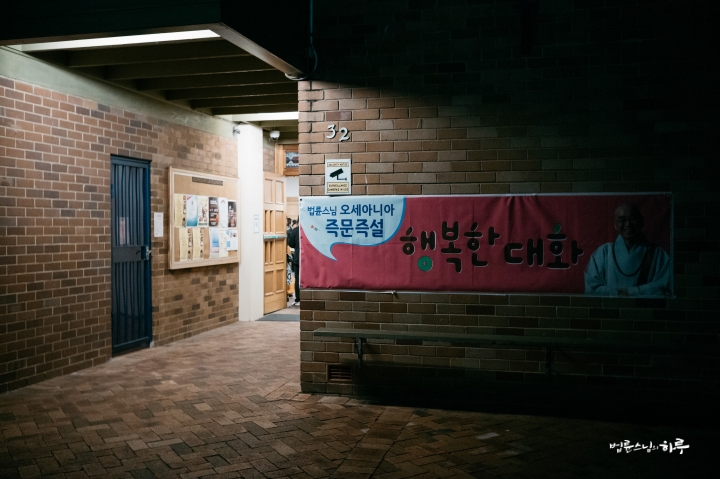
Tomorrow morning, he will take a flight from Sydney Airport to Auckland Airport in New Zealand, and in the afternoon, he will give a Dharma Q&A lecture for Korean residents living in New Zealand.





